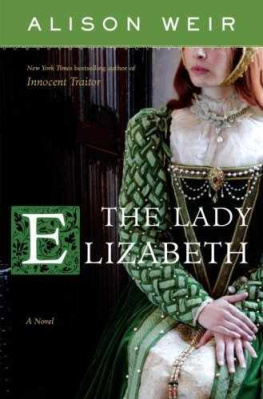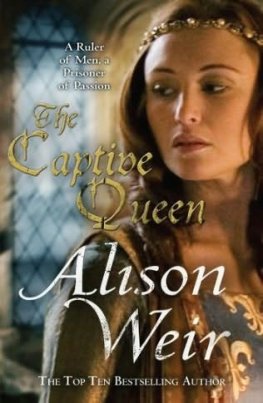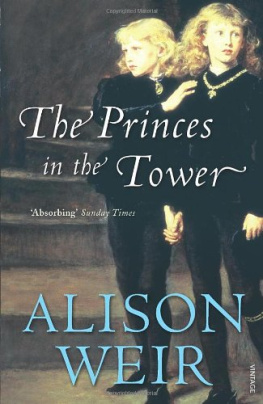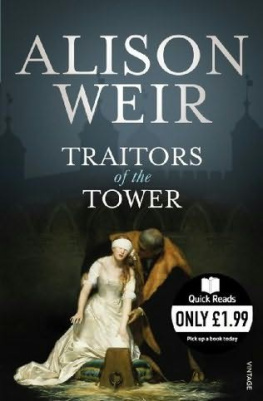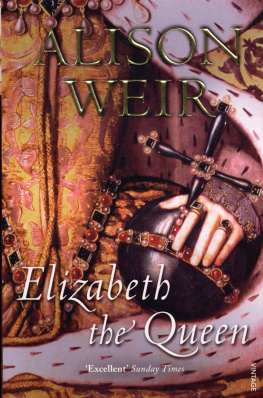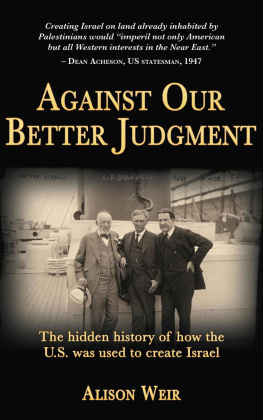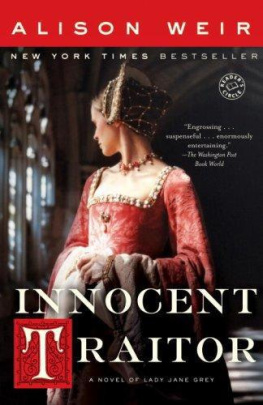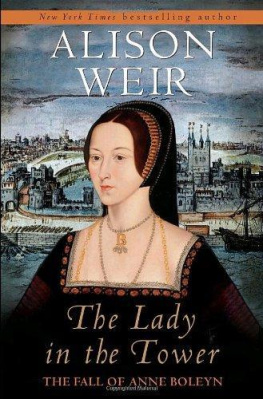Alison Weir - The Lady Elizabeth
Here you can read online Alison Weir - The Lady Elizabeth full text of the book (entire story) in english for free. Download pdf and epub, get meaning, cover and reviews about this ebook. year: 2008, publisher: Ballantine Books, genre: Non-fiction. Description of the work, (preface) as well as reviews are available. Best literature library LitArk.com created for fans of good reading and offers a wide selection of genres:
Romance novel
Science fiction
Adventure
Detective
Science
History
Home and family
Prose
Art
Politics
Computer
Non-fiction
Religion
Business
Children
Humor
Choose a favorite category and find really read worthwhile books. Enjoy immersion in the world of imagination, feel the emotions of the characters or learn something new for yourself, make an fascinating discovery.
- Book:The Lady Elizabeth
- Author:
- Publisher:Ballantine Books
- Genre:
- Year:2008
- Rating:4 / 5
- Favourites:Add to favourites
- Your mark:
- 80
- 1
- 2
- 3
- 4
- 5
The Lady Elizabeth: summary, description and annotation
We offer to read an annotation, description, summary or preface (depends on what the author of the book "The Lady Elizabeth" wrote himself). If you haven't found the necessary information about the book — write in the comments, we will try to find it.
The Lady Elizabeth — read online for free the complete book (whole text) full work
Below is the text of the book, divided by pages. System saving the place of the last page read, allows you to conveniently read the book "The Lady Elizabeth" online for free, without having to search again every time where you left off. Put a bookmark, and you can go to the page where you finished reading at any time.
Font size:
Interval:
Bookmark:
Acknowledgments
First, I wish to acknowledge my huge debt of gratitude to Anthony Whittome, my commissioning editor at Hutchinson, for suggesting this project and inspiring me to write with renewed enthusiasm about Elizabeth. I should also like to thank him for his expert and sensitive editorial suggestions, and to express my gratitude also to my line editor, the author Kirsty Crawford, whose own books I have so greatly enjoyed, and to the editorial teams at Hutchinson, Arrow, and Ballantine, in particular Kate Elton, James Nightingale, Mandy Greenfield, and Shona McCarthy.
I want to say a special thank-you to my agent, Julian Alexander, who has been tremendously supportive throughout, as ever, and whose invaluable creative suggestions have informed this novel. And I should like to thank Susanna Porter, my editor at Ballantine in the United States, for her enthusiastic and very helpful contributions, and Lisa Barnes, my American publicist.
I wish to convey my gratitude to Jeff Cottenden and Richard Ogle for producing another stunning jacket. I should also like to thank all the publishing teams in marketing, publicity, and sales for the excellent, but often unacknowledged, work that they do.
I cannot sufficiently express my appreciation to the historian Sarah Gristwood, author of Elizabeth and Leicester, for taking time out from a busy schedule to read my manuscript and offer her professional and much-valued observations. I wish also to say a huge thank-you to all the other kind people who have helped and supported me in various ways throughout the writing of this book, notably the historian Tracy Borman, who is herself currently researching a book on Elizabeth I; and also, in no particular order, my mother, Doreen Cullen; my son, John Weir; my daughter, Kate Weir; my cousin, Christine Armour; John and Jo Marston; Peter and Karen Marston; David and Catherine Marston; Samantha Brown at Historic Royal Palaces; Siobhan Clarke, Ann Morrice, Leza Mitchell, Lesley Ronaldson, Sarah Levine, and Kathleen Carroll at Hampton Court; David Crothers and Richard Stubbings at Kultureshock; Alison Montgomerie and Roger England; Jean and Nick Hubbard; Richard Foreman; Ian Franklin; Kerry Gill-Pryde; Father Luke at Holy Cross, Carshalton; Laurel Joseph at Whitehall, Cheam; Roger Katz and Karin Scherer at Hatchards; Gary and Barbara Leeds; Patricia Macleod and Anita Myatt at Sutton Library; Heather Macleod; Ian Robinson, for web design and management; Shelley and Burnell Tucker; Jane Robins; Jessie Childs; Nicola Tallis; Martha Whittome; Christopher Warwick; Kate Williams; Pete Taylor; Jo Young; Richard McPaul; Linda Collins.
Last, as always, my loving thanks go to Rankin, my husband. Without your constant devoted support, this book wouldnt exist!
ALSO BY ALISON WEIR
Britains Royal Families: The Complete Genealogy
The Six Wives of Henry VIII
The Princes in the Tower
The Wars of the Roses
The Children of Henry VIII
The Life of Elizabeth I
Eleanor of Aquitaine
Henry VIII: The King and His Court
Mary, Queen of Scots, and the Murder of Lord Darnley
Queen Isabella
Innocent Traitor: A Novel of Lady Jane Grey
ABOUT THE AUTHOR
ALISON WEIR published her first book, Britains Royal Families, in 1989, and has since written many other historical works, among them The Six Wives of Henry VIII, The Life of Elizabeth I, Eleanor of Aquitaine, Henry VIII: The King and His Court, and The Princes in the Tower, as well as two novels, Innocent Traitor: A Novel of Lady Jane Grey and The Lady Elizabeth. She lives in Surrey, England, with her husband.
Authors Note
In telling this story of Elizabeth Is early life, I have endeavored to keep as far as possible to the known facts. Most of the characters and events in this book are a matter of historical record, and much of the dialoguealthough slightly modernized in placesis based on the actual words of people who lived at the time (sometimes transposed to another character for the purpose of putting across a point of view). However, I have nevertheless taken some dramatic license, and telescoped events here and there, particularly in the latter sections of the book. For example, I have dealt with certain issues in just one conversation when there might have been two or three that were relevant, and I have omitted one or two unimportant episodes in the interests of avoiding repetition, since they merely echo what has gone before.
I make no apology for the fact that, for dramatic purposes, I have woven into my story a tale that goes against all my instincts as a historian! Indeed, I have argued many times in the past, in print, in lectures, and on radio and television, why I firmly believe that Elizabeth I was the Virgin Queen she claimed to be, since the historical evidence would appear to support that. Yet we can never know for certain what happens in a persons private life. There were rumors and there were legends, and upon them I have based the highly controversial aspect of this novel, Elizabeths pregnancy. I am not, as a historian, saying that it could have happened; but as a novelist, I enjoy the heady freedom to ask: What if it had?
It is on record that in 1548 there were rumors about Elizabeth miscarrying Seymours child. It was noted that she was first sick about midsummer, about a month after arriving at Cheshunt, and the illness lasted until late autumn; during it, according to Mrs. Astley, Elizabeth had not gone more than a mile from the house. The very paucity of information about this illness could have been the result of a cover-up on the part of those who were anxious to avoid scandal.
The gossip about Elizabeth and the Admiral continued well into 1549. Jane Dormer, Duchess of Feriaa friend of Mary Tudor and therefore not unbiasedrecalled many years later how a country midwife was visited by a mysterious gentleman in the middle of the night. He made her ride blindfolded with him, and took her to a mansion she had never seen before, to attend to a very fair young lady who was in labor. As soon as her child had been born, the man brutally had it miserably destroyed. The midwife talked, and word soon got about that the young lady had been Elizabeth, no less, although the woman had not been sure about that. These are the original sources on which I have based this part of the novel, although, as a historian, I should like to stress that there is no reliable evidence that Elizabeth had a miscarriage, and that the theory rests on rumor and supposition alone.
The accounts of Admiral Seymours morning romps with Elizabeth, and the shocking episode when her dress was cut to ribbons, are all based on fact. But it occurred to me during the course of writing this book that the traditional view of Elizabeths governess, Kat Astley, as simply a loving and protective mother figure just does not fit in with what is known of her behavior with regard to the Thomas Seymour affair. Hence I have spun a subplot about her motives, which explains what possibly drove her to act as she did. It is on record that, immediately after Queen Katherines death, Kat began pressing Elizabeth to marry Seymour.
Marys suspicions as to Elizabeths paternity are a matter of historical recordand unlike this story, they were never resolvedas are her increasingly difficult relations with Elizabeth. Modern readers may find the child Elizabeth unduly precocious; I make no apology for that, because she was exceptionally advanced for her years, as well as being formidably intelligent and sharp, and in this novel her precocity is based largely on that famous quote made to her governor when she was not yet threeWhy, governor, how hath it, yesterday Lady Princess, and today but Lady Elizabeth?and on her early letters, such as the one on chapter 5, as well as my own experiences as both mother and teacher of children.
Next pageFont size:
Interval:
Bookmark:
Similar books «The Lady Elizabeth»
Look at similar books to The Lady Elizabeth. We have selected literature similar in name and meaning in the hope of providing readers with more options to find new, interesting, not yet read works.
Discussion, reviews of the book The Lady Elizabeth and just readers' own opinions. Leave your comments, write what you think about the work, its meaning or the main characters. Specify what exactly you liked and what you didn't like, and why you think so.

